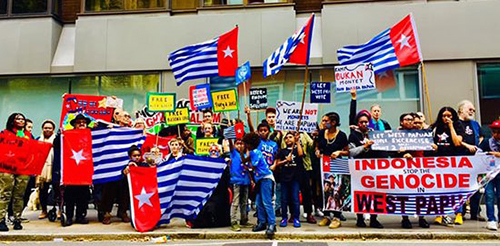West Papua, the last frontier where humanity's greatness and wickedness are tested and where tragedy, aspiration and hope are revealed

YAMIN KOGOYA
BRISBANE - On 30 June the Indonesian parliament in Jakarta passed legislation to split West Papua into three more pieces.
The Papuan people's unifying name for their independence struggle, West Papua, is now being shattered by Jakarta's draconian policies.
Under this new legislation, the two existing provinces have been divided into five, which include South Papua, Central Papua and Highland Papua.
And in Papua’s capital, Jayapura, last week, Indonesia’s vice president Ma'ruf Amin said that “right now, we are building Papua better”.
Indonesian News Agency Antara reported the vice-president continuing: “Changes to special autonomy are a natural thing and are in the process of the national policy cycle to make things even better.”
While Jakarta is busy tearing apart West Papua with these deceitful words, Papuans were everywhere called to raise the banned Morning Star flag on Thursday 1 December to commemorate West Papua's 61th Independence Day.
West Papua had been known as The Netherlands New Guinea until 19 October 1961 when the first New Guinea Council (Nieuw Guinea Raad) gave it the name of a new modern nation-state, the Papuan Independent State.
But when Indonesia invaded West Papua on 1 May 1963 that was changed to Irian Jaya.
However, the name 'West Papua' remained a burning flame in the hearts of all living beings who yearn for freedom and justice. Papuans were not going to give up their sacred ancestral land without a fight.
In 2000 Indonesian president, Abdurrahman Wahid, famously known as Gusdur, changed the name from Irian Jaya to Papua, a move that etched a special place for Gusdur in the hearts of Papuans.
In 2003, not only did West Papua's name change, but West Papua was split in half to form Papua and West Papua.
The fragmentation was achieved by Megawati Sukarnoputri, daughter of the first Indonesian president, Sukarno, the man responsible for over 60 years of Papuan bloodshed.
Megawati violated a provision of the Special Autonomy Law of 2001, which was based on the premise that Papua would remain a single territory.
A significant aspect of the first Special Autonomy Law was that any new policy introduced by the central government in relation to the identity of West Papua must be approved by the Papuan People's Assembly. But this never happened.
As prescribed by law, a division would need to be approved by the Papuan provincial legislature and local Papuan cultural assembly, institutions set by Jakarta itself to safeguard the Papuan peoples language, and culture.
Now in 2022 marks another tragic turning point as West Papua is divided again under President Jokowi, and with no consultation.
That said, it is common for the Jakartan elites to act inconsistently with their own laws when dealing with West Papua.
The disdain and demeaning behaviour of Indonesian governments towards Papuans over the past 60 years are unforgivable and stained permanently in the soul of every living being in West Papua and the New Guinea island.
‘Right now, we are building Papua better’, declared, Indonesia’s vice president, a narcissistic utterance from the highest office of the country illustrating Jakarta's complete dishonesty and disconnect from West Papua.
West Papua has endured since it was described numerous times by foreign invaders as ‘IIha de Papo’ and ‘o'Pauas’ to ‘Isla de Oro’ (‘Island of Gold’).
We Papuans were named by colonisers and regarded as unintelligent pygmies, cannibals and pagan savages; people without value.
Various foreign colonial intruders were able to enter West Papua and exploit and treat the Papuan people and land as their own.
In addition to fostering a racist mindset, this depiction and mistreatment did not represent the reality as it was experienced and understood by Papuans over thousands of years.
The Jakarta settler colonial government continues to engage with West Papua with these profoundly misconstrued ideas.
Now, of course, the eastern half of the island remains under one name: Papua New Guinea.
And now Jakarta's colonial rulers have just created five more settler provinces on the island’s western side: South Papua Province, Central Papua Province and Central Highlands Papua Province.
All these new settler colonial provinces are in the heart of New Guinea.
Looking at West Papua's history, we see so many marks and bruises of abuse and torture on her sacred body. In the future, West Papua is likely to suffer more torture despite deceitful words from Indonesia’s vice president.
Thursday 1 December marked yet another sacred day when we held West Papua in our hearts and rallied to her defence as her enemy seeks to cut her into pieces.
West Papua is an ancient and original particle, an atom of light and hope. It is a story about survival, resistance, betrayal, destruction, genocide and survival against the odds.
It is the last frontier where humanity's greatness and wickedness are tested, and where tragedy, aspiration, and hope are revealed.
West Papua is the home of our original ancestors, the archaic Autochthons, the spiritual ancestors of our dream-time spiritual warriors- the pioneers of nature – the first voyageur across dangerous seas and land – the first agriculturalist – the most authentic, the original – we are the past and we are the future.
West Papua is the original dream that has yet to be realised - a dream in the process of restoration to its original glory.
This is where West Papua is now. You cut me into pieces, I will rebuild West Papua with these pieces a million times over again.
